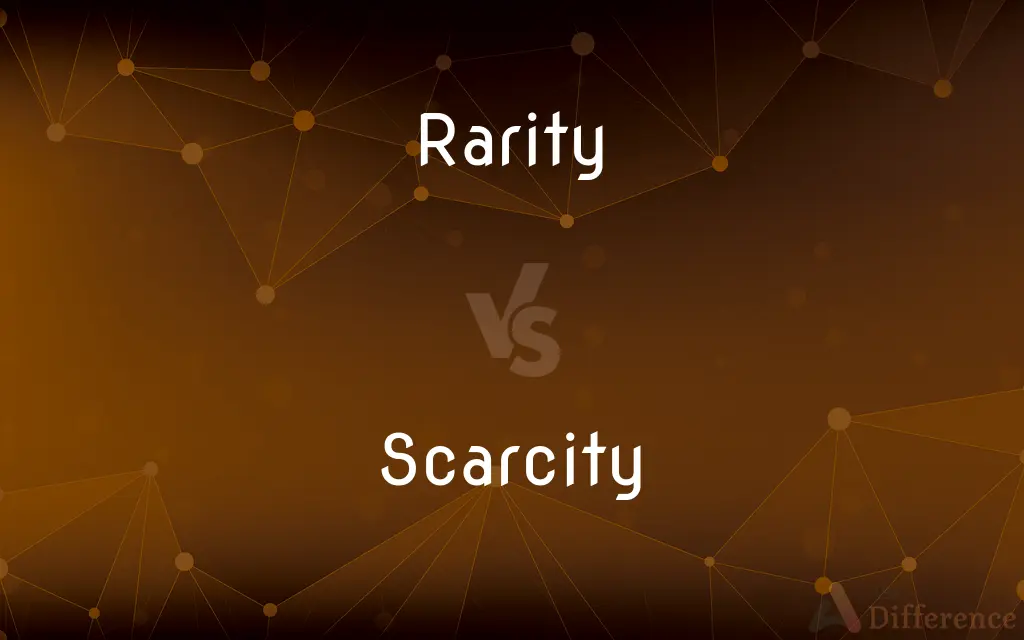Rarity vs. Scarcity — What's the Difference?
By Tayyaba Rehman — Published on October 18, 2023
Rarity refers to something being uncommon or infrequent, while Scarcity indicates a shortfall or insufficiency in quantity or supply.

Difference Between Rarity and Scarcity
Table of Contents
ADVERTISEMENT
Key Differences
Rarity embodies the quality of being rare, suggesting that something is not found or seen often. Scarcity, on the other hand, emphasizes a lack or shortage, especially concerning resources or goods.
Rarity often carries a positive connotation, hinting at uniqueness or special value. Scarcity, meanwhile, frequently connotes a problem or challenge, highlighting a situation where demand exceeds supply.
When something holds the characteristic of Rarity, it may or may not be scarce. For instance, a unique artwork is a rarity, but it's not necessarily scarce since it's one of a kind. Scarcity doesn't always make things rare; water might be scarce in a desert, but it's not rare globally.
Rarity can be applied to situations, experiences, or phenomena that are infrequent or uncommon. Scarcity, in contrast, primarily refers to tangible items or resources in inadequate amounts.
To summarize, while both terms describe limited availability, Rarity leans towards infrequency or uniqueness, and Scarcity highlights a deficit or insufficiency.
ADVERTISEMENT
Comparison Chart
Connotation
Often positive, indicating uniqueness
Generally negative, indicating a shortage
Applicability
Can apply to experiences, objects, or phenomena
Primarily refers to tangible items or resources
Implication
Uncommonness or infrequency
Lack or insufficiency
Value Association
Unique or special value
Problem or challenge due to insufficient supply
Example
Rare artifacts in a museum
Scarcity of water in arid regions
Compare with Definitions
Rarity
Rarity signifies the state of being rare or infrequent.
The blue moon is a rarity.
Scarcity
Scarcity emphasizes a situation where demand outstrips supply.
The popular toy's scarcity led to increased prices.
Rarity
Rarity indicates an uncommon occurrence.
Such kindness is a rarity these days.
Scarcity
Scarcity denotes a lack or shortage.
The scarcity of jobs in the town concerned the residents.
Rarity
Rarity represents something unique or special.
That signed book is a true rarity.
Scarcity
Scarcity portrays limited availability.
There's a scarcity of tickets for the concert.
Rarity
Rarity embodies unusual or exceptional qualities.
The diamond's clarity made it a rarity.
Scarcity
Scarcity refers to insufficiency in supply.
Due to scarcity of water, rationing was imposed.
Rarity
Something rare.
Scarcity
Insufficiency of amount or supply; shortage
A scarcity of food that was caused by drought.
Rarity
The quality or state of being rare; infrequency of occurrence.
Scarcity
Rarity of appearance or occurrence
Antiques that are valued for their scarcity.
Rarity
A measure of the scarcity of an object.
Scarcity
(uncountable) The condition of something being scarce or deficient.
Rarity
Thinness; the property of having low density
Scarcity
(countable) An inadequate amount of something; a shortage.
A scarcity of grain
Rarity
A rare object.
Scarcity
A small and inadequate amount
Rarity
The quality or state of being rare; rareness; thinness; as, the rarity (contrasted with the density) of gases.
Scarcity
Scarcity indicates a deficit or dearth.
The region faced a scarcity of food.
Rarity
That which is rare; an uncommon thing; a thing valued for its scarcity.
I saw three rarities of different kinds, which pleased me more than any other shows in the place.
Rarity
Noteworthy scarcity
Rarity
A rarified quality;
The tenuity of the upper atmosphere
Rarity
Something unusual -- perhaps worthy of collecting
Rarity
Rarity describes something that is seldom found.
A genuine friend is a rarity.
Common Curiosities
Can something be both a rarity and scarce?
Yes, an item can be both infrequently found (Rarity) and in short supply (Scarcity).
Does Rarity always imply value?
Not necessarily, but Rarity often adds perceived value due to uniqueness.
What often results from Scarcity in economic terms?
Scarcity can drive up prices and create competition for resources.
How does Scarcity impact decision-making?
Scarcity often necessitates prioritization and can influence purchasing or consumption behaviors.
How does Rarity relate to frequency?
Rarity is associated with infrequency or uncommonness.
Is a vintage item an example of Rarity?
Often, yes. Vintage items, especially those hard to find, are considered rarities.
Is Scarcity always negative?
While Scarcity typically connotes a challenge, it can sometimes increase demand or value for an item.
How do Rarity and Scarcity affect market prices?
Rarity often increases perceived value, while Scarcity can drive up prices due to increased demand.
Is every unique item a rarity?
Yes, unique items, by definition, are rarities because they are one of a kind.
Can Rarity exist without Scarcity?
Yes, something can be rare or uncommon without being in short supply.
Can experiences be described as rarities?
Yes, unique or infrequent experiences can be termed rarities.
Are limited edition items examples of Scarcity?
Yes, limited edition items are intentionally made scarce to increase demand and perceived value.
How do Rarity and Scarcity impact consumer behavior?
Both can increase demand, with Rarity enhancing perceived value and Scarcity creating urgency to acquire.
How can businesses use Scarcity as a tactic?
Businesses can limit product availability or offer "limited time" deals to create a sense of Scarcity and boost sales.
What factors can lead to Scarcity?
Overconsumption, limited production, natural disasters, and population growth can lead to Scarcity.
Share Your Discovery

Previous Comparison
Nurturing vs. Sympathetic
Next Comparison
Peanut Butter vs. JamAuthor Spotlight
Written by
Tayyaba RehmanTayyaba Rehman is a distinguished writer, currently serving as a primary contributor to askdifference.com. As a researcher in semantics and etymology, Tayyaba's passion for the complexity of languages and their distinctions has found a perfect home on the platform. Tayyaba delves into the intricacies of language, distinguishing between commonly confused words and phrases, thereby providing clarity for readers worldwide.
















































